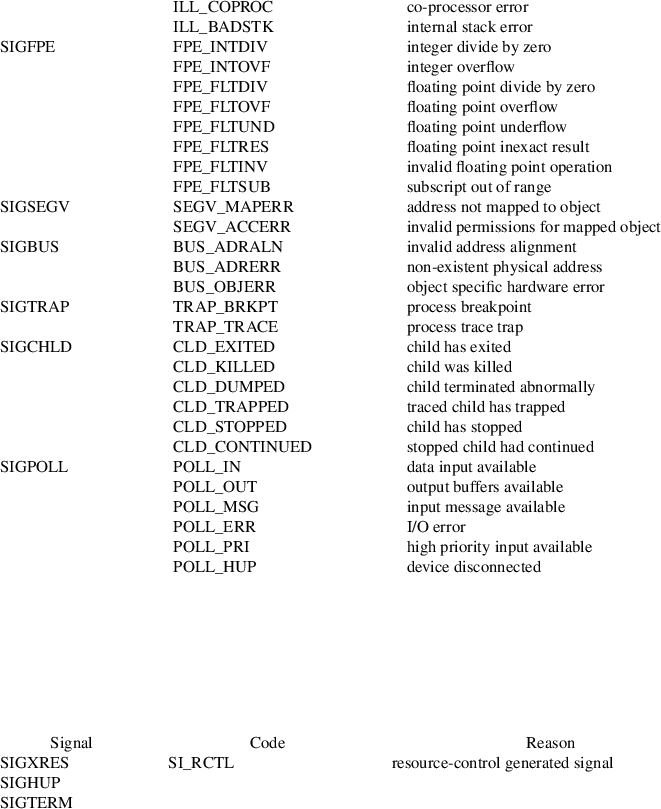NAME
siginfo − signal generation information
SYNOPSIS
#include <siginfo.h>
DESCRIPTION
If a process is catching a signal, it might request information that tells why the system generated that signal. See sigaction(2). If a process is monitoring its children, it might receive information that tells why a child changed state. See waitid(2). In either case, the system returns the information in a structure of type siginfo_t, which includes the following information:
int si_signo /* signal number */ int si_errno /* error number */ int si_code /* signal code */ union sigval si_value /* signal value */
si_signo contains the system-generated signal number. For the waitid(2) function, si_signo is always SIGCHLD.
If si_errno is non-zero, it contains an error number associated with this signal, as defined in <errno.h>.
si_code contains a code identifying the cause of the signal.
If the value of the si_code member is SI_NOINFO, only the si_signo member of siginfo_t is meaningful, and the value of all other members is unspecified.
User
Signals
If the value of si_code is less than or equal to 0,
then the signal was generated by a user process (see
kill(2), _lwp_kill(2), sigqueue(3RT),
sigsend(2), abort(3C), and raise(3C))
and the siginfo structure contains the following
additional information:
typedef long pid_t si_pid /* sending process ID */ typedef long uid_t si_uid /* sending user ID */
If the signal
was generated by a user process, the following values are
defined for si_code:
SI_USER
The implementation sets si_code to SI_USER if the signal was sent by kill(2), sigsend(2), raise(3C) or abort(3C).
SI_LWP
The signal was sent by _lwp_kill(2).
SI_QUEUE
The signal was sent by sigqueue(3RT).
SI_TIMER
The signal was generated by the expiration of a timer created by timer_settime(3RT).
SI_ASYNCIO
The signal was generated by the completion of an asynchronous I/O request.
SI_MESGQ
The signal was generated by the arrival of a message on an empty message queue. See mq_notify(3RT).
si_value contains the application specified value, which is passed to the application’s signal-catching function at the time of the signal delivery if si_code is any of SI_QUEUE, SI_TIMER, SI_ASYNCHIO, or SI_MESGQ.
System
Signals
Non-user generated signals can arise for a number of
reasons. For all of these cases, si_code contains a
positive value reflecting the reason why the system
generated the signal:

Signals can also be generated from the resource control subsystem. Where these signals do not already possess kernel-level siginfo codes, the siginfo si_code will be filled with SI_RCTL to indicate a kernel-generated signal from an established resource control value.

The uncatchable signals SIGSTOP and SIGKILL have undefined siginfo codes.
Signals sent with a siginfo code of SI_RCTL contain code-dependent information for kernel-generated signals:

In addition, the following signal-dependent information is available for kernel-generated signals:

SEE ALSO
_lwp_kill(2), kill(2), setrctl(2), sigaction(2), sigsend(2), waitid(2), abort(3C), aio_read(3RT), mq_notify(3RT), raise(3C), signal(3HEAD), sigqueue(3RT), timer_create(3RT), timer_settime(3RT)
NOTES
For SIGCHLD signals, if si_code is equal to CLD_EXITED, then si_status is equal to the exit value of the process; otherwise, it is equal to the signal that caused the process to change state. For some implementations, the exact value of si_addr might not be available; in that case, si_addr is guaranteed to be on the same page as the faulting instruction or memory reference.